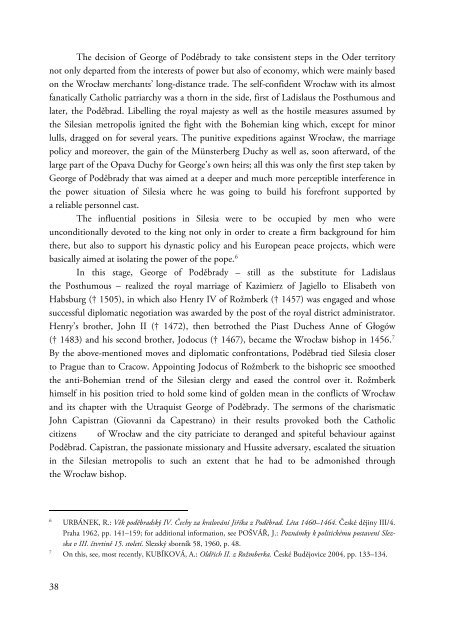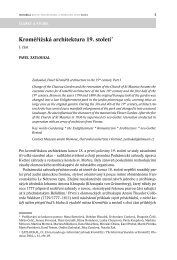- Page 1 and 2: ACTA FACULTATIS PHILOSOPHICAEUNIVER
- Page 5 and 6: ObsahSlovo úvodem 9Igor LISOVÝMar
- Page 7 and 8: InhaltDas Einleitungswort 9Igor LIS
- Page 9 and 10: Milá Nino a vážená paní profes
- Page 11 and 12: UNIVERSITAS OSTRAVIENSISHISTORICAAC
- Page 13 and 14: o větrech 13 autor používá řec
- Page 15 and 16: těm, kteří dovedli mužně vést
- Page 17: SummaryLUCIUS AMPELIUS - THE „CLE
- Page 20 and 21: V posledních letech se objevilo i
- Page 22 and 23: fyziognomické rysy, s jejichž pop
- Page 24 and 25: pak v Čechách po králově příj
- Page 26 and 27: vyobrazení mladého krále na foli
- Page 28 and 29: Jde o vyobrazení, které se nejča
- Page 30 and 31: Ze srovnání výše uvedených vyo
- Page 32 and 33: Obrazová příloha▲ (2) Zásnubn
- Page 35 and 36: UNIVERSITAS OSTRAVIENSISHISTORICAAC
- Page 37: to Wrocław, Albrecht of Austria mo
- Page 41 and 42: Until his death in 1490, Matthias c
- Page 43 and 44: account that the inhabitants of Low
- Page 45 and 46: Contrary to this, the establishment
- Page 47 and 48: UNIVERSITAS OSTRAVIENSISHISTORICAAC
- Page 49 and 50: zaczął znaczącą rolę. Podróż
- Page 51 and 52: Podróż pierwszego z podróżnikó
- Page 53 and 54: „Wulkanusa”, 29 a także kanał
- Page 55: ZusammenfassungOBERSCHLESIEN UND OB
- Page 58 and 59: probuzení lidu k národně politic
- Page 60 and 61: zůstanu jen správcem jmění kura
- Page 62 and 63: eagoval na konci června velmi př
- Page 64 and 65: nána, podle zápisu měla být pro
- Page 66 and 67: svého nejlepšího uvážení. 73
- Page 68 and 69: SummaryTHE BITTER END OF THE NEWSPA
- Page 70 and 71: přinášeli nové zkušenosti a po
- Page 72: V prvních letech představovali č
- Page 76 and 77: v Dělnickém domě. Pod záštitou
- Page 78 and 79: Nové stanovy si vzaly za vzor stat
- Page 80 and 81: v posledních zmíněných stanová
- Page 82 and 83: Politické události února 1948 za
- Page 85 and 86: UNIVERSITAS OSTRAVIENSISHISTORICAAC
- Page 87 and 88: nebude, zůstane s outěžkem - kom
- Page 89 and 90:
Jak byla rodina (zřejmě ne manže
- Page 91 and 92:
Vzdělání a Evina výchovaJaké b
- Page 93 and 94:
Zachycené příběhy žen tří ge
- Page 95 and 96:
i starý vzor druhých sňatků vdo
- Page 97 and 98:
UNIVERSITAS OSTRAVIENSISHISTORICAAC
- Page 99 and 100:
železo a ocel na polotovary a zč
- Page 101 and 102:
z několika vrstev železných plá
- Page 103 and 104:
Zahájení výroby lodních pancé
- Page 105 and 106:
ného pána Daublebskyho von Sterne
- Page 107 and 108:
Licenční smlouva s HarveyemVítko
- Page 109 and 110:
veyovou společností a firmou Frie
- Page 111:
des Harvey-Vertrags scheint wirklic
- Page 114 and 115:
Ostrava. V Zábřehu sídlilo podle
- Page 116 and 117:
i osobního přesvědčení buď za
- Page 118 and 119:
28. a 29. září 1904. Česká vl
- Page 120 and 121:
volebním k volbě určitě a v pra
- Page 122 and 123:
nic nezměnila ani skutečnost, že
- Page 124 and 125:
Ostravský odbor Národní rady se
- Page 126 and 127:
ResuméRELATIONSHIPS BETWEEN THE MU
- Page 128 and 129:
pragmatickému myšlení obvyklému
- Page 130 and 131:
čenstev napsal, že „je naše (
- Page 132 and 133:
i na vesnických školách, ale jej
- Page 134 and 135:
5.Dolní vrstvy neměly až do zač
- Page 137 and 138:
UNIVERSITAS OSTRAVIENSISHISTORICAAC
- Page 139 and 140:
v Ostravě v roce 1988 nebo byly pu
- Page 141 and 142:
Nový velký státní znak obsahova
- Page 143 and 144:
Čech, Moravy a Slezska umístili d
- Page 145 and 146:
oce 1960 bylo podobných horlivců
- Page 147 and 148:
a Kladska, do jehož znaku vložil
- Page 149:
ZusammenfassungDIE BILDENDE ENTWICK
- Page 152 and 153:
Na jaře 1920 se schylovalo jak ve
- Page 154 and 155:
návrhy. Rozebrat celý tento kompl
- Page 156 and 157:
uchopit vedení strany levicí a pr
- Page 158 and 159:
velmi skeptický, domnívám se vš
- Page 160 and 161:
SummaryTHE CENTRE OF SOCIAL DEMOCRA
- Page 162 and 163:
té obchodní školy kráčela rych
- Page 164 and 165:
lena do zastupitelstva a následně
- Page 166 and 167:
promluvila třikrát v plénu, jedn
- Page 168 and 169:
mnohem kratší, než doufala. Hekt
- Page 170 and 171:
movní síni slavného Rudolfina o
- Page 173 and 174:
UNIVERSITAS OSTRAVIENSISHISTORICAAC
- Page 175 and 176:
no touto cestou uplatnit svůj pom
- Page 177 and 178:
zovali jejich zástupci předevší
- Page 179 and 180:
Národní výbor zasedal 2. května
- Page 181 and 182:
Hulváky byly lokalitou národnostn
- Page 183:
ZusammenfassungDIE VERWALTUNG VON O
- Page 186 and 187:
V novodobých česko(slovensko)-pol
- Page 188 and 189:
Československa a ostře útočili
- Page 190 and 191:
vlaků s Poláky z Itálie do Polsk
- Page 192 and 193:
Zakonzervování předmnichovského
- Page 195:
K HISTÓRII VZNIKU PROTIKOMUNISTICK
- Page 213 and 214:
UNIVERSITAS OSTRAVIENSISHISTORICAAC
- Page 215 and 216:
průměrnými tržbami rozpočtovan
- Page 217 and 218:
Tab. 3: Nárůst výnosu všeobecn
- Page 219:
SummaryCONSEQUENCES OF POLISH MONET
- Page 222 and 223:
Podle nich byli v této farnosti po
- Page 224 and 225:
Moravské Ostravy, vytvořené krá
- Page 226 and 227:
Nejprve publikovala 9. března 1942
- Page 228 and 229:
SummaryINSTROSPECTION IN TO THE „
- Page 230 and 231:
Ačkoliv žijí Romové v Evropě p
- Page 232 and 233:
V roce 1926 byla v sousedním Bavor
- Page 234 and 235:
nem „c“. Podle jednoho z dalš
- Page 236 and 237:
jednoho Roma. Hledisko bylo přísn
- Page 238 and 239:
nerealizovatelnost při zjišťová
- Page 240 and 241:
Události dostávaly rychlý spád.
- Page 242 and 243:
Rozkaz šéfa německé policie a S
- Page 244 and 245:
mu. 72 Podobným způsobem byly upr
- Page 246 and 247:
ResuméTHE DEFINITION OF „GYPSY
- Page 248 and 249:
Ve Státním okresním archivu ve F
- Page 250 and 251:
uz, Międzyrzecze, Mosty u Jablunko
- Page 252 and 253:
Pravděpodobně měla do každé lo
- Page 254 and 255:
Pořadové čísloPolitický okresD
- Page 256 and 257:
Pořadové čísloPolitický okresD
- Page 258 and 259:
Pořadové čísloPolitický okresD
- Page 260 and 261:
Pořadové čísloPolitický okresD
- Page 262 and 263:
Pořadové čísloPolitický okresD
- Page 265 and 266:
UNIVERSITAS OSTRAVIENSISHISTORICAAC
- Page 267 and 268:
tity využitých mechanizmů a méd
- Page 269 and 270:
u textu nebyly opravovány gramatic
- Page 271 and 272:
(80) Tak ráda vzpomínám na zašl
- Page 273 and 274:
máždění st. Franta Dobiáš sam
- Page 275 and 276:
Obrazová příloha▲ (1) Křest v
- Page 277 and 278:
UNIVERSITAS OSTRAVIENSISHISTORICAAC
- Page 279 and 280:
vůči Sovětskému svazu a Rudé a
- Page 281 and 282:
z nás musí pomoci v čištění v
- Page 283 and 284:
slovo a sociálnědemokratické Pr
- Page 285 and 286:
ně po válce (Zdeněk Nejedlý v r
- Page 287 and 288:
války hnali desítky milionů lid
- Page 289 and 290:
sekyrou a pilou nerozuměli ani če
- Page 291 and 292:
o nezničené podstatě Německa: v
- Page 293 and 294:
SummaryTHE GERMAN MINORITY IN THE C
- Page 295 and 296:
UNIVERSITAS OSTRAVIENSISHISTORICAAC
- Page 297 and 298:
V tomto příspěvku se soustředí
- Page 299 and 300:
označení Romů), či jiné osoby
- Page 301 and 302:
z možnosti získat příděl země
- Page 303 and 304:
v českých zemích do 15. listopad
- Page 305:
SummaryCZECHOSLOVAKIA’S ROMANIES
- Page 308 and 309:
V období prvej republiky patrili K
- Page 310 and 311:
požiadavky menej konkrétne často
- Page 312 and 313:
susedných Kysúc. Úrady ochrany p
- Page 314 and 315:
možností, ale aj společenská vy
- Page 316 and 317:
SummaryKYSUCE´S INHABITANTS IN OST
- Page 318 and 319:
Poválečný vývoj romského etnik
- Page 320 and 321:
a mládeže - podle krajů a okres
- Page 322 and 323:
Zdrojovou zemí, resp. prostředím
- Page 324 and 325:
letkového typu v Dělnické ulici
- Page 326 and 327:
Na jeden „cikánský byt“ (jak
- Page 328 and 329:
SummaryROMANY IMMIGRANTS IN OSTRAVA
- Page 330 and 331:
zentace o stavu a výsledcích jedn
- Page 332 and 333:
k touze po návratu do ČSR, která
- Page 334 and 335:
Celkem 320 rodin žilo ve vlastníc
- Page 336 and 337:
všichni přesídlenci se budou vra
- Page 338 and 339:
SummaryTHE EFFORTS OF SO CALLED RUS
- Page 340 and 341:
Je samozřejmě třeba zdůraznit,
- Page 342 and 343:
také romské pohádky. Ve školní
- Page 344 and 345:
většinou přistupovali k výzkumu
- Page 348:
ACTA FACULTATIS PHILOSOPHICAEHISTOR










